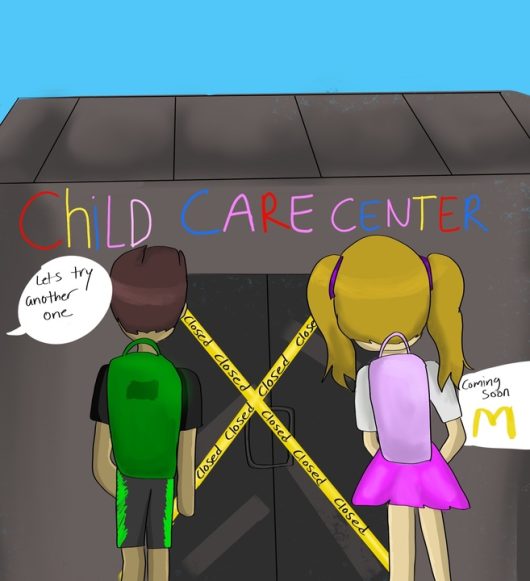Across the country, childcare programs are facing closure due to a lack of financial support, according to CNBC. This dire situation not only affects families directly but also has long-term consequences for our society as a whole. It is imperative that we invest in and support childcare programs to ensure a brighter future for our children and generations to come.
The pandemic has greatly affected childcare programs. The economic downturn throughout the pandemic has resulted in increased operational costs and these programs losing the ability to provide basic items such as food and materials.
During the pandemic, more than 220,000 childcare providers were supported by federal funding, using the funds towards personnel costs, rent, equipment and more, according to Time. As a result of the loss of federal funding, many childcare programs are struggling to make ends meet, jeopardizing their ability to continue providing quality care and education to young children.
Childcare providers should be able to focus on caring for children. They should not have to worry about how they are going to pay their rent or equipment costs. Losing access to childcare because of the lack of federal funding is unfair to parents who rely on childcare for their children.
Families are spending on average, 27% of their household income on childcare expenses, according to Care.com, an online marketplace to find care such as child care and pet care. Childcare needs to be more affordable, especially for families that work.
Families have other bills and commitments to worry about such as mortgages, electric bills and car insurance. They should not have to pay significant amounts of money for something as crucial as childcare.
Due to the loss of funding that was given during the pandemic, more than 70,000 childcare programs will likely close and approximately 3.2 million children could lose their childcare spots, according to The Century Foundation. This is heartbreaking, especially for parents who rely on childcare for their children.
During the Covid-19 pandemic, the White House passed a relief bill called the American Rescue Plan. Part of the goals of the relief bill were to expand childcare assistance by increasing tax credits to help cover the cost of childcare, according to the White House.
Kristin Schulz, executive director of the Child Development and Family Center at NIU, explained that childcare centers have many different sources of funds.
“Currently childcare centers are funded through a mismatch of funding. Some centers are tuition-based centers alone, some centers piece together state subsidies with tuition and grant funding to help make their budgets come together,” Schulz said.
Childcare centers need to have one main source of funding instead of multiple sources. The government should be the sole source of funding for childcare. Children are a crucial part of our society and deserve to be supported by the government.
Schulz also explained that childcare tuition costs are outrageous.
“Having families cover that tuition is very expensive for families when you think about the fact that the tuition that a program is charging isn’t just covering the costs of the teacher caring for the child,” Schulz said. “It is also covering the cost of materials, potentially the building and rent, insurance, food and any upkeep to the building that is required. Families are paying a lot for their children to be in childcare if they don’t qualify for subsidies.”
In Washington D.C., families are spending anywhere from hundreds to thousands of dollars per month on childcare. The average monthly costs for childcare range from $1,666 for a single-child family to $4,069 for a family with four kids, according to the Economic Policy Institute.
This is an insane amount of money that people are spending for childcare. People can’t bring their children to work with them. It’s crucial that childcare be more affordable.
By providing the financial support necessary for childcare programs, we ensure that families have access to high-quality childcare services while enabling parents to pursue their careers. Let us recognize the importance of these programs and take decisive action to secure their future. Together, we can build a brighter future for our children and empower the next generation to thrive.
















